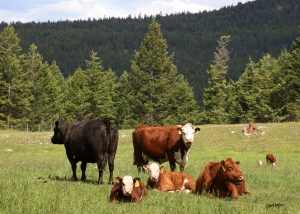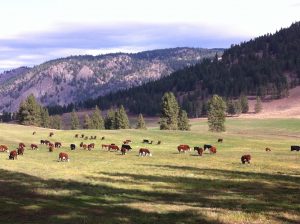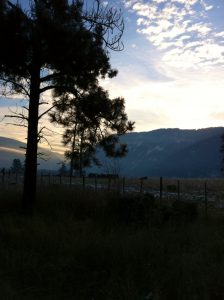Do we grow out of the ashes of destruction? We do.
Our forests are burning.
Do we rise out of chaos and destruction? We do.
Perhaps the contrast and conflict was necessary to help us see her opposite.
Yesterday, my husband and I followed a paved road to hell – to a more densely populated area in Abbotsford and Chilliwack – neighbouring Vancouver’s suburbia, to visit a fellow cattle breeder.
Canadian immigrants are moving here in droves to chase “the American dream” but it is not pretty. It is crowded and chaotic. There is “dis-ease” and frantic enterprise everywhere the eye can see. Forests are being demolished and fields poisoned and waterways polluted. And the existing infrastructure is failing to accommodate the overflowing population and so construction is underway – everywhere the eye can see – to build it bigger. To build it wider. To build it higher. And souls are being paved over.
Take care of all of the quiet, gentle ones, for they are being run over. It is loud. It is bustling and it has gained a momentum that must surely fail if it is to ever slow down. A virtual paradise is being paved over and occupied in droves. Populated and commercialized by our own “culture” gone awry. Power needs are larger, so energy-disrupting power plants spring up where arable land – rich, arable land – once lay. Concrete. Metal. Cold. Loud. Peace-disrupting. Traffic chaos and a loss of kindness for the souls that pass one another by or get in one another’s way. God forbid. We don’t look one another in the eye here.
This is happening. Much to my shock and horror. This is all just a three-hour drive, by truck or car, from our doorstep. And I’m afraid for our world if that is to be the fruits of mankind’s labour. We have lost our way.
The women are hiding. Or they are playing the game.
Fancy cars are everywhere. That was the promise.
The riches of physical luxury accommodations and fancy vehicles. Monetary wealth and riches. Opulence. The conquering of Mother Nature; or her subduing.
But her time has come.
And she is rising up.
Her power rises up within me.
I cry as her rose petals fall and for the devastation of trampled-on petals; for our loss of delicate, receptive, compassion. Destruction.
The fall of mankind.
The poisoning of her flesh.
Her rivers of blood. They flow red. I bleed. I bleed tears of sorrow for the unconscious carnage.
Roads littered. Souls participating – being paid to participate – in her carnage and destruction.
I weep. I see. I pray that her fierceness sets it all straight. She is a more powerful force than all that we experienced that day in a sensory overload of chaos, in the midst of which we just wanted to flee.
And while the locals voice disgruntled disgust about the chaos and inconveniences of travel in a once peaceful, safe place, they have also normalized it as progress and invevitablel change, which someday, they’ll escape for greener pastures……once the kids are grown. Humans have come here to secure the land’s physical resources in the name of personal gain.
Immigration should happen freely but should not be a means of escaping one land of carnage for another – for the chance at succeeding in this cold industrial game in which no-one actually “wins”. No-one is held or loved here. Big machines roam the lands on which mothers and children largely take refuge inside. What they don’t see won’t harm them. Or so they think. They are being fed. But what poisons are they being fed? We were the foreigners in their prison, on our day of travel. We were most definitely out of place; shell-shocked.
Dr. Zach Bush likens our separation from our life sources to a cancerous cell, which he describes as the most isolated cell in the body. How ironic, that in the busiest, most populated sectors, that isolation would be the result. It has, because our distractions have separated us from one another; from our very own hearts. “A cell in isolation looses its metabolic potential because it is no longer cooperative; it’s no longer quorum-sensing,” says Bush. “It behaves as though it’s the last living cell and all it can do is reproduce itself. It doesn’t have enough energy to repair itself. So it splits and splits and becomes a tumour – a cancer – sucking energy out of its environment because it can no longer produce its own energy, he says. “And that’s what humans are on the planet right now. We can no longer repair ourselves because we’ve depleted the energy within us. We have been so disconnected from our own energy sources that we are sucking energy out of the planet at an accelerated rate. We are an extractive force. And we are doing that because of our isolation.”
In the ego world of competition and defensiveness, we have adopted the belief that we alone are not enough and our egos tell us this every day, as we frantically work, compete and collect more “stuff” to fill our emotional voids. The same goes for addictions and media absorption, in Bush’s opinion. He describes it as an effort to fill all the perceived gaps in our selves. Seeing ourselves separate from nature is what has generated our scarcity mindset, says Bush, and that is a vicious cycle.
“The more we move into industrialized nation behaviour, the more we separate ourselves, forgetting that we are synergistic co-creative beings with life,” says Bush, in a late 2021 podcast interview. When we get quiet, he says, we should hear an internal scream – in response to our nerve-numbing infrastructures and to our overdosing of information and to our fear of death and our fight to avoid it at all costs. He validates this “internal scream” as being very rational. Yesterday I heard that internal scream.
American farmers, says Bush, are a dying breed. They are dying of suicide and cancer and their children are choosing not to follow in their footsteps. “They are on the frontlines of chemical warfare against nature,” believing that we are in competition with her. “We need to step into harmony with the nature that allowed us to show up in the first place; that CALLED us to show up in the first place,” he says.
We went to visit a cattle producer yesterday.
The GPS said we were almost there – four, three, two minutes away. Yet we were still in the midst of insane traffic and congestion and the fixtures of suburbia. The disenfranchised people were scattered about. The neglected. The abused. The traumatized souls.
And we do like everyone else and look the other way, powerless to change the world as we coast by in our vehicle, inside six lanes of traffic.
A turn at the next traffic lights featured a street with some trees. Some life. Some hope. Some breath. Some wholesomeness. And then the small paddock and a few red-white-faced beasts, lie there, claiming their own real estate of grass allowed to them; possible because the “gentleman-farmer’s” own development enterprises afford him the luxury of this remaining green space, left from where he spent his childhood years, around the corner, where just 30 years ago there were dirt roads and where a child could freely go down the main roads on his bicycle without risking his life. Dare we ask, “Is this progress?” We didn’t.
Cows in a pasture, but look all ways and see the encroaching insanity. Immigrant farmers purchased the land next door, cleared the trees and sprayed the fields with Roundup to kill all flora and fauna and microorganisms, before planting their mono crops of blueberries because those are the profitable commodities of the day.
The farmer we visited purchased land across the road, from family friends, to escape its ultimate fate as another blueberry farm. Yet neither is this land tended to or loved, even so. The old barns are delapitated. Manure piles line the barn yard. The fields are arid and chopped up and sad. A far cry from the area’s pastoral roots.
A square field of 30-ish acres, grazed by cows, surrounded by bustling development and flanked by a massive power plant.
Cows – which represent grounded, quiet, open country, connected living – there, in stark contrast to a mad, mad world. They are given their space, as a stroke of fate, to be surrounded by human enterprise so outside of our natural world – so disconnected from her spirit – that I cannot fathom its survival.
She WILL be reckoned with.
She WILL face her reckoning.
Man’s industries will crumble into wasteland. Perhaps by burial, under surrounding mountains. Perhaps the lands will sink into the oceans. Perhaps it will be scattered by floods and wind storms. Perhaps it will burn to the ground.
But man will surely be reminded of her fierceness. Of her power.
We drive home. We follow the paved road to hell backwards.
My nervous system is on overload. There is much traffic and road-building. Many impatient drivers everywhere. “Weekend warriors” fleeing their chaos for their temporary enjoyment of their piece of greener spaces, wherever they find them.
I look away from the roadway. Trees are burning. Big swaths of forest are burning. Tears roll down my face.
“I see you,” I say to the trees.
Multi-species, living in utmost harmony, carpeting the forest floor and connecting under ground, holding one another in solidarity and quorum-sensing – the ability for living things to non-verbally communicate with one another to regulate each other’s gene expression, in support of their respective highest good.
“I see you, trees. I honour you. I stand for you, even as I fly past you. I am with you in spirit. Land of the spirit. Land of the overlooked souls that would save us all. Wash over me. Carry me home.
Connect me to your underground joy of life.
Connect me to my senses, that I might honour yours, so we can create anew, together.”


